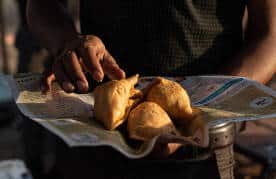Nearly one-third of respondents in mid-2021 said family members had gone hungry over the last month.
Despite dire need, government cash and food support has stagnated since the first three months of the pandemic.
A global study tracking informal workers’ lives during the COVID-19 crisis has found their economic recovery has stalled, with households experiencing high levels of hunger amidst waning government support.
The WIEGO-led COVID-19 and the Informal Economy study examines how workers in informal employment from 11 cities in nine countries are faring now compared to their pre-COVID economic conditions in February 2020.
The latest research paints a picture of a stalled recovery: most respondents have not fully returned to work, their earnings are far below pre-pandemic levels, and few have received a vaccine. WIEGO’s data aligns with ILO predictions of a “great divergence” in recovery paths of higher and lower income countries.
It also showed how governments, despite their goal for economic recovery post-COVID, have failed to help the majority of the world’s workers get back to work and reestablish their livelihoods.
WIEGO’s International Coordinator, Dr. Sally Roever, says the severe and sustained disruptions to work and earnings create challenges in meeting basic food needs. “Across the sample in mid-2021, 29% of respondents reported an adult in their household had gone hungry over the last month, 27% reported that a child had gone hungry and the majority, just under 60%, reported a decrease in dietary diversity or less-frequent meals,” she says.
“Households in Lima, Durban and Dakar were the hardest hit on this front. These findings are a stark and sobering reminder of how the slow recovery unfolding in the global South has a very real human cost. Informal workers and their families are still living this crisis, and the longer they live without policy support, the wider the gulf between developed and developing countries will be.”
Dr. Mike Rogan, Lead Researcher for the COVID-19 Crisis and the Informal Economy Study, mentions this is combined with access to government relief dropping off. “Access to government cash support stagnated during the course of the study, and the percentage of respondents who received food support declined since the first three months of the pandemic. The percentages of workers who received forgiveness of rent, utilities and/or school tuition were in the single digits. This lack of support forced many workers to take on new loans, draw down on their savings, and reduce their food intake.”
“Beyond relief measures, the study showed government interventions did more harm than good, particularly in regards to workers getting back to work. Our research found almost 50% of respondents needed money to get back to work, and only 7% received government loans, while governments also prevented people from working in public spaces”, says Dr. Rogan. The study found that by contrast, over one quarter of street vendors and market traders, as well as 15% of waste pickers, reported harassment by law enforcement officials.
Workers in informal employment interviewed in the study highlighted the following needs for recovery:
- Providing immediate material needs, notably food aid and cash grants to replace savings, pay off debt and restore assets.
- Providing working capital for livelihoods and businesses, through grants or low-interest loans.
- Supporting employment and/or livelihood recovery and transition, by creating and/or facilitating new employment, skills training and widespread vaccination for reopening.
- Expanding social protection, including access to social insurance, health care and basic income support on terms equal to those of formal workers.
- Promoting an enabling policy and legal framework, including inclusive urban planning for the self-employed, minimum wages or piece rates, fair working hours, and health and safety requirements for employees and dependent contractors.
- Following the principle of “Do no harm”, by allowing workers to pursue their livelihoods, protecting their workplaces, and ending punitive practices of harassment, confiscation, fines and evictions.
For interviews or further information, please contact:
Nicole Pryor - nicole.pryor@wiego.org, Graciela Mora - graciela.mora@wiego.org
Editor’s notes
Women in Informal Employment: Globalizing and Organizing (WIEGO) is a global network focused on empowering the working poor, especially women, in the informal economy to secure their livelihoods. We believe all workers should have equal economic opportunities, rights, protection and voice. WIEGO promotes change by improving statistics and expanding knowledge on the informal economy, building networks and capacity among informal worker organizations and, jointly with the networks and organizations, influencing local, national and international policies.
The COVID-19 Crisis and the Informal Economy study is a collaboration between Women in Informal Employment: Globalizing and Organizing (WIEGO) and partner organizations representing informal workers in 12 cities: Accra, Ghana; Ahmedabad, India; Bangkok, Thailand; Dakar, Senegal; Dar es Salaam, Tanzania; Delhi, India; Durban, South Africa; Lima, Peru; Mexico City, Mexico; Pleven, Bulgaria; New York City, USA; and Tiruppur, India; with support from the International Development Research Centre, Canada. The mixed methods longitudinal study includes survey questionnaires of informal workers and semi-structured interviews with informal worker leaders and other key informants, all conducted by phone. Please note: The study data from Dar es Salaam, Tanzania, with domestic workers is not included in the global results because of the relatively larger sample from one sector, which would have skewed the global results. All global tabulations and comparisons therefore refer to 11 cities.
